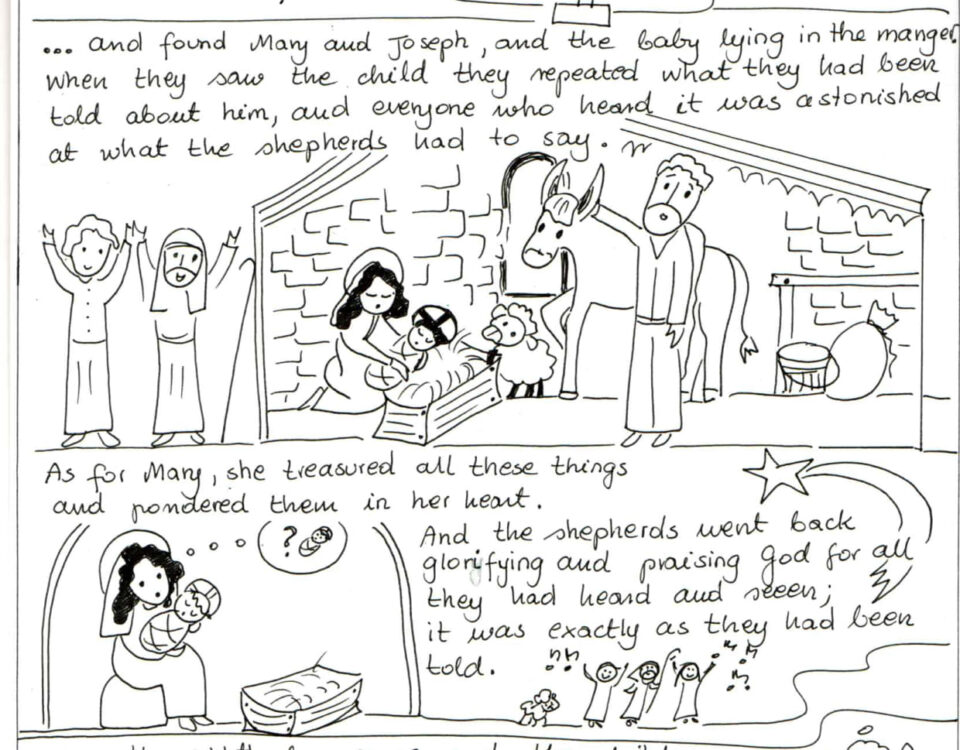Divine Retreat Centre UK – Official Website
Which mystery do you identify with?
April 24, 2023Children’s liturgy – John 14: 1-12– I am the Way, the Truth and the Life
May 12, 2023One of the greatest sacraments instituted by Jesus Christ, the sacrament of reconciliation, or confession is a beautiful reminder of the unending love that God our Father has showered upon us, to bring us back to His loving gaze. However, confession is greatly misinterpreted and under-utilized by the Christian faithful. The phrase, “Forgive me Father, for I have sinned” is uttered, oftentimes, without any true feelings of remorse or regret.
Why do we need to confess to a priest?
True repentance is hard to be encountered even in the scriptures. Pharaoh for instance, said to Moses, “I have sinned…” but continued in his deceit. So did Balaam and Judas, whose repentance proved to be just hollow words of deception. We all sometimes wonder why we cannot confess our sins directly to God. We conclude that God knows all our secrets anyway, and will forgive us if we confess directly to Him.
A priest is after all a mere human who is a representative of Jesus. Why would I confess to a human being, who is also a sinner? How can a sinner forgive my sins? These are questions that could have plagued our minds and probably prevented us from taking the sacrament of confession in all its seriousness.
So, why do we need to confess to a priest?
Jesus said to them again, “Peace be with you. As the Father has sent me, so I send you.” When he had said this, he breathed on them and said to them, “Receive the Holy Spirit.” {John 20:21-22 } The sacrament of confession was established by Jesus. The Father sent His son Jesus to this earth with full authority and full power to heal, power to cast out the devil, and power to forgive the sins.
Biblical references prove that the same authority that has been given to Jesus has now been transferred to His disciples. This is a special gift- A Sacrament. The gift of the Holy Spirit, given to the disciples when Jesus proclaimed, “when you forgive the sins of any, they are forgiven them; if you retain the sins of any, they are retained.” [John 20:23] The disciples had the authority not just to forgive sins, but to retain them as well.
Peter – The Foundation Stone
A fundamental truth that is revealed through the bible is that the secrets of heaven cannot be entirely deciphered through our intellect, logic, or reasoning, but only through our Father in Heaven. We reach the spiritual realm only if our Father in heaven wills us to.
When Simon Peter said, “You are the Messiah, the Son of the living God.” And Jesus answered him, “Blessed are you, Simon son of Jonah! For flesh and blood has not revealed this to you but my Father in heaven’’, [Matthew 16:16-18] Jesus reveals to us that we cannot grasp God completely, because we are the creatures, and not The Creator. The secrets are not revealed to us through flesh and blood, but through the Father in Heaven.
We further encounter Jesus affirming to Peter, “And I tell you, you are Peter, and on this rock, I will build my church, and the gates of Hades will not prevail against it.” [Matthew 16:18]
Jesus gave the Keys of Heaven to Peter. In Peter rests all authority. All priests, bishops, and the ordained participate in this authority given to Peter, as Peter is considered as the ‘Foundation Stone’, though Jesus is the corner stone according to the word of God. Therefore, if anyone says, “I will go directly to Jesus to confess my sins, Jesus undoubtedly responds from heaven, “My dear child, I have given the authority to absolve, forgive or retain your sins to Peter. Why do you have to come to me again?”
Why did God give such authority to a human being?
If Jesus can die for us on the cross, and give so much value and importance to mere humans like us, why can’t He give this authority to His disciples to forgive the sins of many? [James 5:16] Therefore confess your sins to one another and pray for one another, so that you may be healed. The prayer of the righteous is powerful and effective.
The early church used to practice public confessions of the faithful, and the elders, and the bishops used to forgive their sins publicly. Later, due to the consequences that arose as a result of public confessions, the church started private confessions. These confessions were more meaningful and less problematic. Remember my dear brothers and sisters; for our prayers to be effective, we must be righteous and free from sins. If we confess our sins, he who is faithful and just will forgive us our sins and cleanse us from all unrighteousness. {1 John 1:9}
Never hide your sins
Sins must never be held secretly. No one who conceals transgressions will prosper, but one who confesses and forsakes them will obtain mercy. (Proverbs 28:13). When you say you will confess directly to God, the sins remain within your system. Imagine that you have wronged your own father, and later repent very deeply. Instead of going to him and saying sorry directly, you repeat words of remorse in your heart, mentally uttering “sorry” a thousand times.
Will your father be able to acknowledge your regret, and know that you have repented? Will you feel happy and relieved that you have repented in your mind, even though your father knows nothing about it?
Now, imagine that you go directly to your father, and express your deep sorrow and regret towards your action. Your father may hug you joyfully, and say, ‘’it’s ok my dear child, I forgive you”. Just imagine how relieved you would feel by these words.
My dear brothers and sisters, human beings are wired to feel ecstasy when they hear words of encouragement and repentance. They need verbal proclamations to be able to relax and feel happy again.
The same is true with repentance towards your father in Heaven. We need to verbalize our act of repentance before a priest, so that it reaches our Father in heaven. Your sins are then absolved through the priest who says,’’ All your sins are forgiven.’’ You must be told by someone who stands in the place of Jesus that all your sins are forgiven unconditionally, to be able to feel joyful and pure again.
Confession is the most powerful sacrament the Lord has created and established for us. It’s a true blessing!
Do we need to be ashamed to confess to the Priests of our Parish?
Many of us feel ashamed to confess to the priests of our parish.
We go through pangs of shame to reveal our true selves in front of a priest who knows us very well. We wait for guest priests to arrive, so that we can confess anonymously.
My dear friends, when we confess our sins truthfully and earnestly, however grave a sin we may have committed, and however notorious we may be within our circle of acquaintances, be assured that the priest who took your confession is the only witness to your holiness. He cannot look at you as a sinner again. He knows that you walked out of the confessional as ‘’a saint’’, perhaps much more purified and spotless than several others who stare and point an accusing finger at you. This is the assurance you must have while you walk out of a confessional, not self-doubt and embarrassment.
The big secret in confession
“Whoever listens to you listens to me, and whoever rejects you rejects me, and whoever rejects me rejects the one who sent me.” {Luke 10:16} Jesus told the apostles, “Whoever listens to you listens to me.” When we listen to a priest say, “I absolve you from all your sins”, we listen to the voice of Jesus. Every priest is a Persona Christi; Jesus personified before us. When a priest says, ‘‘you are blessed’’, you are indeed blessed by Jesus. Therefore, every time you see a priest, take his blessing, and confess your sins as often as possible.
Sometimes you may have had negative experiences from a priest that might make you averse towards confession altogether. Remember that all priests are not the same. At times, you are in doubt as to whether you must confess or not, as you know that you are bound to repeat that sin again. The devil will prompt you to think,” Stop confessing, as you have no control on that sin!” Stop confessing, as you have priests who are unapproachable.”
Wrong choice!
Confess your sin, and stop sinning!
Why do we need to confess?
Do you know that every sin that we commit breaks four kinds of relationships?
When Adam and Eve committed sin, their relationship with God was broken. They started hiding from God. Sin breaks our relationship with others. Adam started blaming his wife; Eve started blaming the serpent, i.e., Satan. Our relationship with Nature is broken when we commit a sin. God said, “You shall not eat of it, cursed is the ground because of you.” Your relationship with yourself is broken. Adam and Eve were ashamed of their nakedness when they committed sin. Nakedness is a sign that you have broken your relationship with yourself. Every single sin that you commit breaks these relationships over and over again.
How do we rectify this?
Now, if you decide to confess your sins directly to God, your relationship with God could be rectified, provided you are able to get through to Him. How would you deal with the other three relationships? When you kneel down in front of a Priest, and say, ‘’Father forgive me, I am a sinner.’’ You reconcile with yourself first. When I say, forgive me father, I am rectifying my relationship with God and myself. When I am confessing to a priest- a human, who represents Jesus, I am rectifying my third relationship – my relationship with other human beings.
I am not confessing my sins secretly in the mind, but openly announcing it into the atmosphere. The echo of my repentance spreads into nature, and reconciles my relationship with nature. All the four types of relationships are therefore re-established.
My dear followers of Christ, let us repent, confess, rectify, and live in peace!
Amen



